Emergency HVAC Wollaston
Find Emergency HVAC Service in Wollaston
Get multiple After Hours HVAC quotes for your project today! Compare profiles, reviews, accreditations, portfolio, etc... and choose the best deal.

A.B.C Plumbing, Heating & Gas Services Ltd
35 reviewsUnit 19 Lye Valley Industrial Estate, Stourbridge, DY9 8HX, GBABC Plumbing & Heating is a family-run business serving the West Midlands area for many years. We pride ourselves on providing efficient and quality plumbing and heating services with our own fully qualified team of engineers. Our commitment to quality is backed by a guarantee, ensuring you're working with a well-respected and reliable company.
- Services
- Why Us?
- Gallery
Get Quote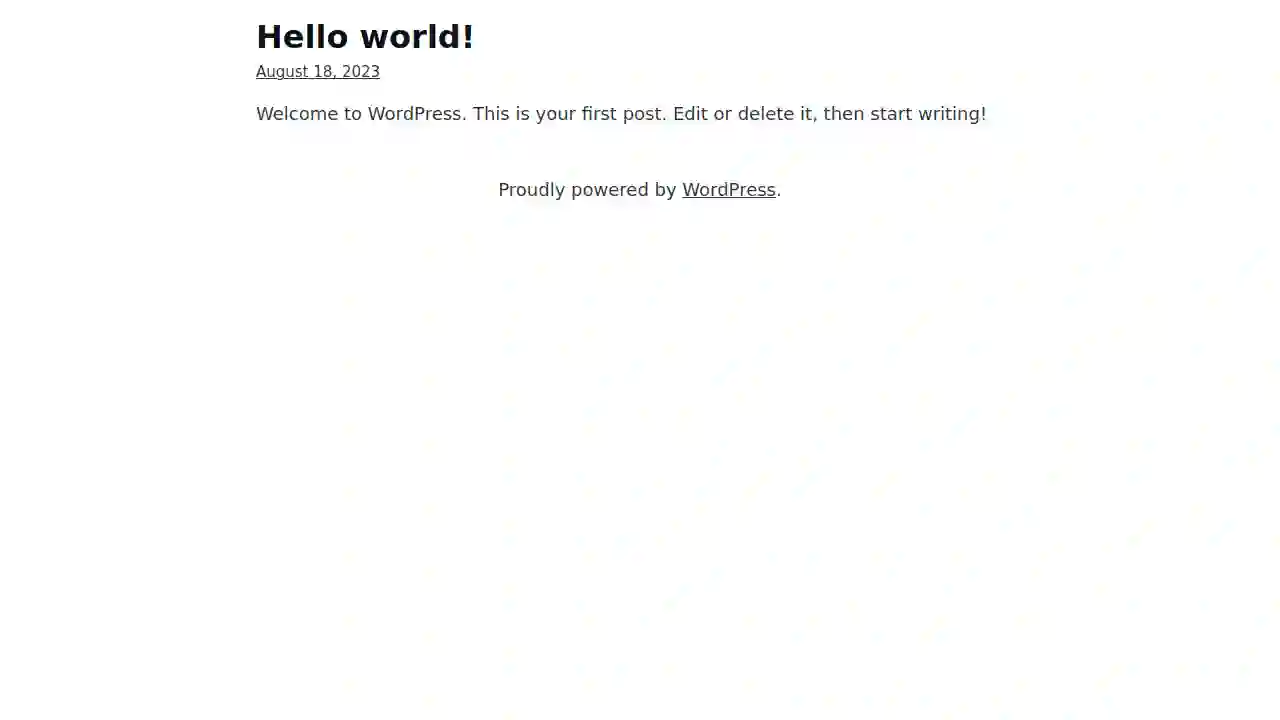
AJS heating ltd
51 reviewsDudley, GBWelcome to WordPress. This is your first post. Edit or delete it, then start writing! Proudly powered by WordPress.
- Services
- Why Us?
Get Quote
Central Heating Hub Stourbridge
52 reviewsBromsgrove, Worcestershire, Unit 1, The Old Mill, B60 3BU, GBCentral Heating Hub is a local, family-run business providing boiler installation, service, and repair services. We offer a range of services, including gas, LPG, oil boiler, boiler cover, heat pump, solar air conditioning, and plumbing engineers. Our team of trained heating engineers are courteous, tidy, and reliable, with a strong standard of workmanship. We also offer a fixed price guarantee and a 10-year gas boiler guarantee. Our boiler cover provides priority unlimited call-outs, same-day call-outs, and 100% of our customers running with heating and hot water. We cover Bromsgrove, Redditch, Birmingham, Worcester, Malvern, Alcester, Stourbridge, Kidderminster, Tenbury Wells, Bridgnorth, Wolverhampton, Stratford-Upon-Avon, and the rest of Worcestershire, Warwickshire, Shropshire, and the West Midlands.
- Services
- Why Us?
- Accreditations
- Gallery
Get Quote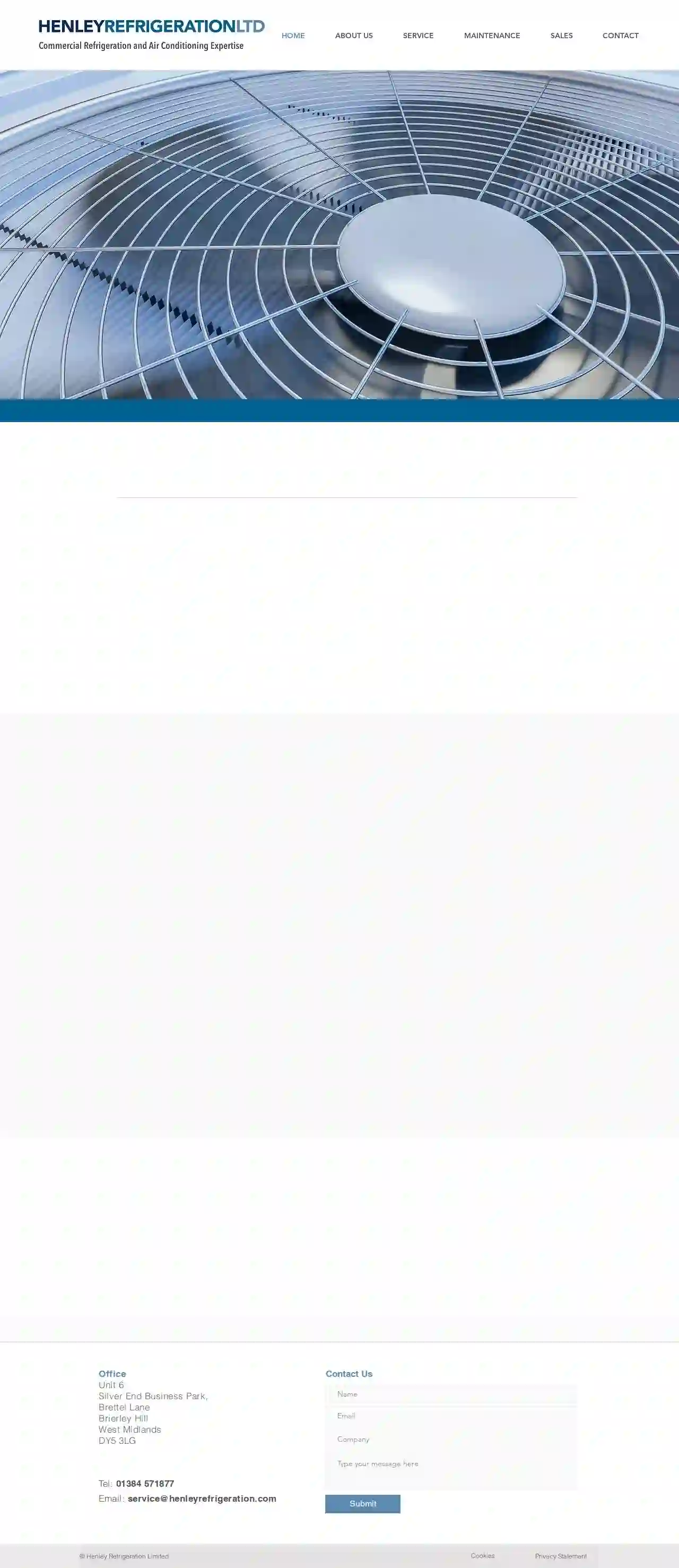
Henley Refrigeration
41 reviewsUnit 6 Silver End Business Park, Brettel Lane Brierley Hill West Midlands, Brierley Hill, DY5 3LG, GBHENLEY REFRIGERATION LIMITED Specialists in commercial refrigeration and air conditioning We are a specialist commercial refrigeration and air conditioning contractor operating directly throughout the greater midlands region and nationally, via our selected service partners. Established in 1992 with the simple aim of providing high quality, dependable, trustworthy complete solution for each and every client Our mission statement is simple, to offer each and every client a complete solution to their individual refrigeration and air conditioning requirements. Our team of technicians operate continuously throughout the greater midlands region, where were strategically well placed to provide speedy and efficient response to those unforeseen emergencies. Office Unit 6 Silver End Business Park, Brettel Lane Brierley Hill West Midlands DY5 3LG Tel: 01384 571877 Email: [email protected]
- Services
- Why Us?
- Gallery
Get Quote
JR Heating Solutions Ltd
59 reviewsStourbridge, GBJR Heating is your trusted local gas and heating engineer serving the West Midlands. We offer a comprehensive range of services to keep your home warm and comfortable all year round. Contact us today to discuss your heating needs and receive a free quote.
- Services
- Why Us?
- Gallery
Get Quote
Air Conditioning and Heating 4 U Ltd
Building 53A, Unit 7, The Pensnett Trading Estate, Kingswinford, DY6 7XG, GBWelcome to Air Conditioning and Heating 4 U. Cooling, Heating and Drying Services West Midlands and Nationwide. Established in 2011, Air Conditioning and Heating For You already have a major client base, providing hire and sales equipment throughout the UK. Driven by the expertise of over 35 years, the company’s specialist area oversees the climate control of major films, live events, marquee heating hire and EMERGENCY CRITICAL COOLING. We offer CONTINUED HIRE AT REDUCED RATES whether that be domestic, commercial or industrial use. We also currently offer: Competitive Servicing of Fixed Air Conditioning Competitive Installation of Fixed Air Conditioning Competitive Portable Air Conditioning Hire Competitive Portable Heating Hire for Marquees, Events, Factories and Leisure Marquee Heater Hire Packages for Festive Parties and Events at a very FESTIVE PRICE! (including delivery, fuel, and installation) We endeavor to beat any other local air conditioning and heating company by at least 40%. In such a short time, the company plays host to a very large new hire fleet for both Fixed and Portable Air Conditioning, Heating and Drying. 24 Hour* Emergency Service We can provide expert 24-hour* Emergency Service available to you 365 days a year for your all you’re Heating and air conditioning needs. Call us on 07538 882244 Years Of Experience We have over 20 years experience in the heating and air conditioning industry. We believe in quality customer service. We are here when you need us! Portable Heating We can provide portable heating from as little as £15 a week! Free Quotes We will be happy to provide you with a free quote, site survey or EMERGENCY Climate Control Use our BTU calculator! Our Services Portable Cooling For all your cooling needs; server room, medical, facilities treatment ... the list goes on! Portable Heating Instant emergency event heating, large UK fleet. Portable Drying Residential, Industrial and Commercial portable drying services. Nationwide and West Midlands flooding and drying control. Fixed Air Conditioning Our fixed range offers a competitive and quality high-end solution for cooling climate control services. Enquire about free air conditioning parts and labour guarantee with some of our air con systems. Service & Maintenance During the lifetime operation of the heating system there may be situations that require reducing or increasing the number of sections, or flush the radiator. Event & Marquee Heater hire for events and marquees is one of our specialties. We provide modern and reliable portable heating systems for live events, marquees, and temporary structures nationwide.Download Our Brochures Need help? Contact Us Today! Car Showrooms Make sure your customers are kept cool We work with a number of car showrooms across the UK to provide new air conditioning systems and to service existing air conditioning systems. We offer a fast turn around and competitive pricing with a customer service second to non. Is yours next? Call now! Data Centres Keep mission-critical systems running We understand the importance of keeping IT infrastructure at a maintained cool temperature which is why we have been fitting and servicing data centre air conditioning across the UK and West Midlands. We also offer emergency portable cooling to keep the systems running smoothly. Contact Air Conditioning and Heating 4 U today We offer 24/7* Emergency Service to all of our customers. West Midlands and Nationwide Cooling and Heating Services.
- Services
- Why Us?
- Gallery
Get Quote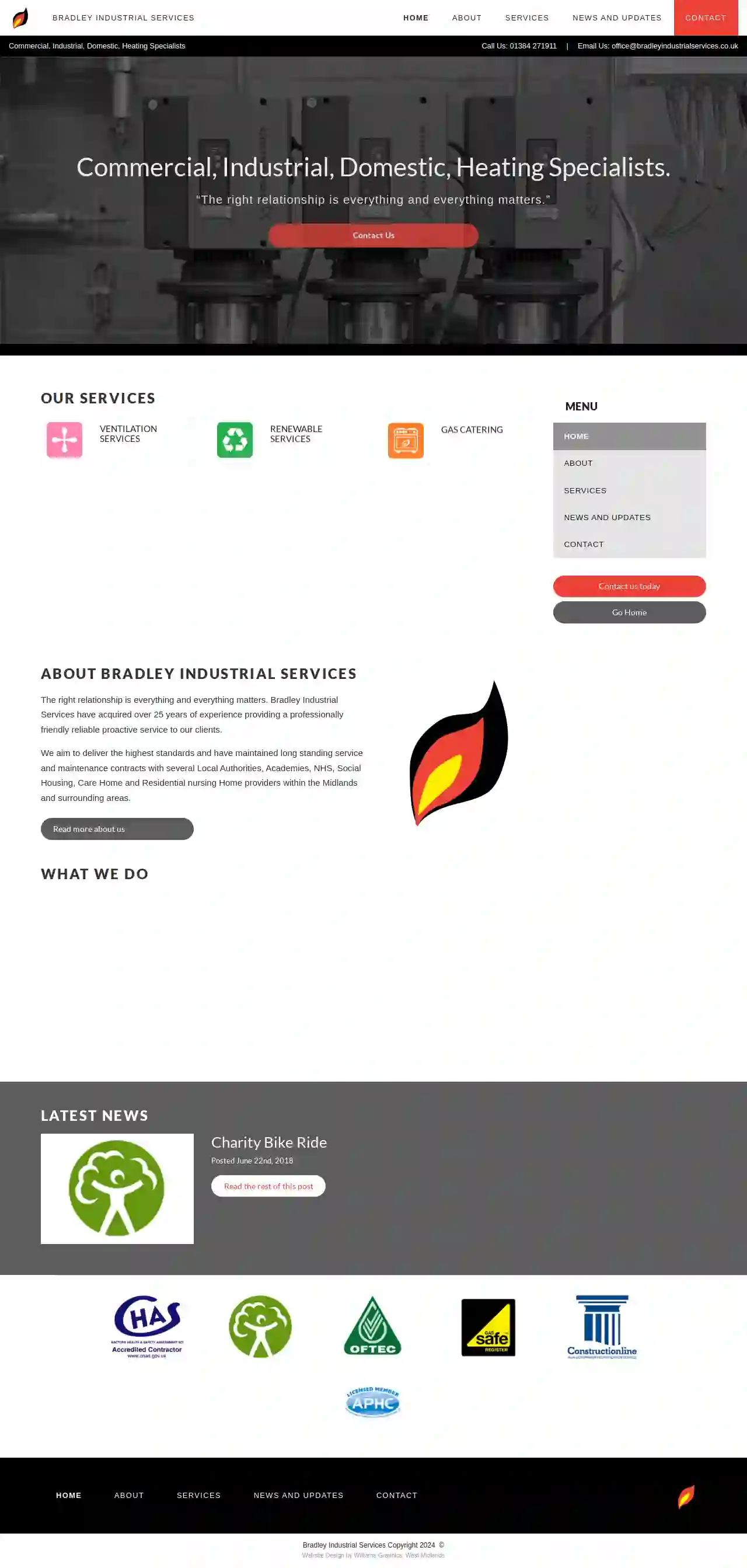
Bradley Industrial Services
51 reviewsStourbridge, GBBradley Industrial Services have acquired over 25 years of experience providing a professionally friendly reliable proactive service to our clients. We aim to deliver the highest standards and have maintained long standing service and maintenance contracts with several Local Authorities, Academies, NHS, Social Housing, Care Home and Residential nursing Home providers within the Midlands and surrounding areas. We understand that every client has different requirements, therefore our philosophy on Service delivery is to offer flexibility and choice through a range of tailored services level Agreements (SLA). Supported by our team of skilled engineers we cover a wide range of systems and Installations on a 24/7 365 day basis to suit requirements. Remaining a family run business we know you care enough to send the best without compromising our legendary reliability we are able to maintain a very competitive pricing structure creating true value.
- Services
- Why Us?
- Gallery
Get Quote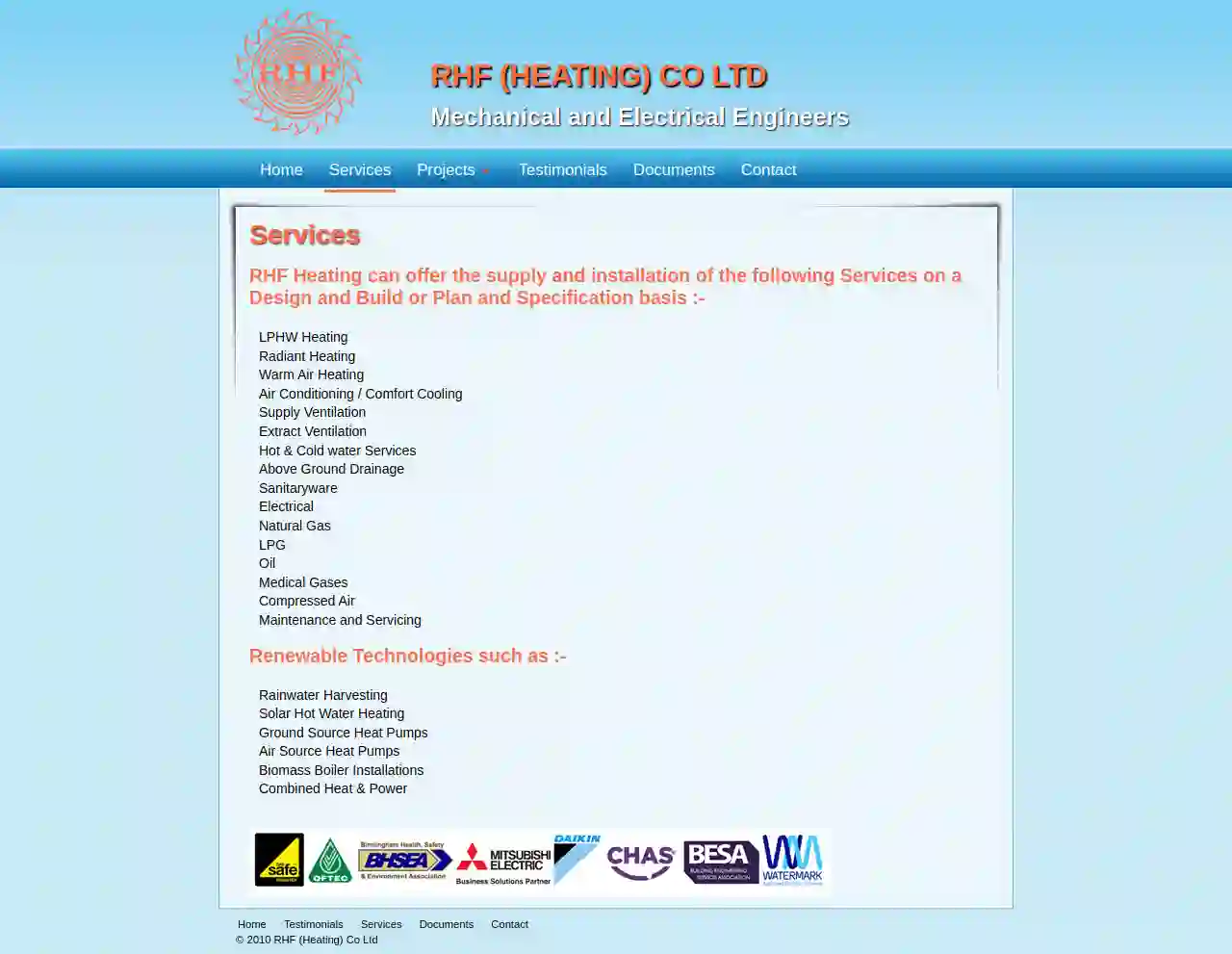
R H F Heating Co Ltd
3.86 reviews71-73 Enville Street, Stourbridge, DY8 1XW, GBRHF (HEATING) CO LTD is a Mechanical and Electrical Engineers company that offers a wide range of services including LPHW Heating, Radiant Heating, Warm Air Heating, Air Conditioning / Comfort Cooling, Supply Ventilation, Extract Ventilation, Hot & Cold water Services, Above Ground Drainage, Sanitaryware, Electrical, Natural Gas, LPG, Oil, Medical Gases, Compressed Air, Maintenance and Servicing, and Renewable Technologies such as Rainwater Harvesting, Solar Hot Water Heating, Ground Source Heat Pumps, Air Source Heat Pumps, Biomass Boiler Installations, and Combined Heat & Power. With a strong commitment to quality and customer satisfaction, RHF Heating has built a reputation for delivering exceptional results in various sectors including Care, Medical, Leisure, Community, Commercial, Education, and more.
- Services
- Why Us?
- Testimonials
- Gallery
Get Quote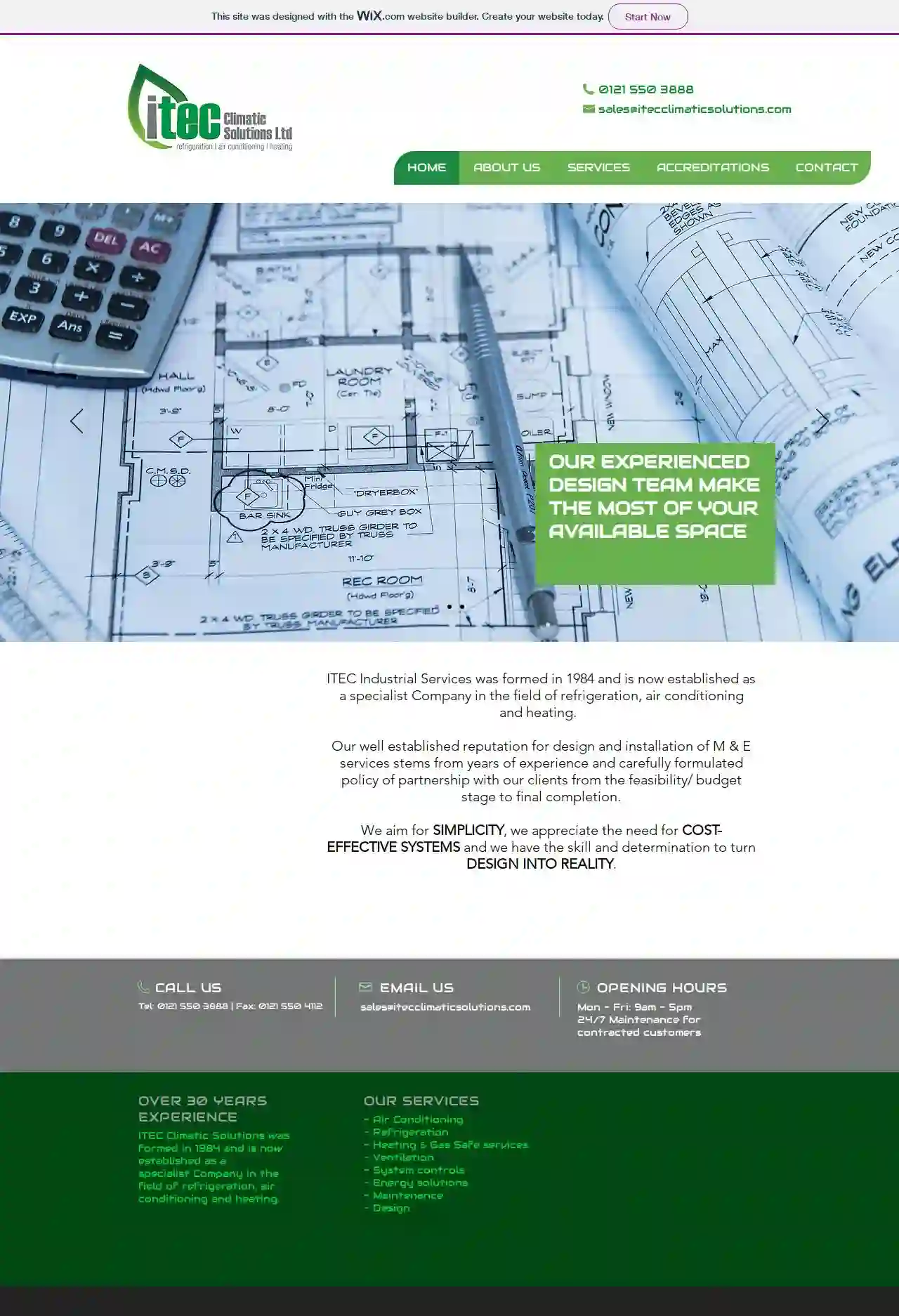
ITEC Climatic Solutions Ltd
51 reviewsStourbridge, GBITEC Industrial Services was formed in 1984 and is now established as a specialist Company in the field of refrigeration, air conditioning and heating. Our well established reputation for design and installation of M & E services stems from years of experience and carefully formulated policy of partnership with our clients from the feasibility/ budget stage to final completion. We aim for SIMPLICITY, we appreciate the need for COST-EFFECTIVE SYSTEMS and we have the skill and determination to turn DESIGN INTO REALITY.OUR EXPERIENCED DESIGN TEAM MAKE THE MOST OF YOUR AVAILABLE SPACE
- Services
- Why Us?
- Gallery
Get Quote
Cool Services - Hire & Sales
53 reviewsBattlefield Enterprise Park, Shrewsbury, 1a Vernon Drive, SY1 3TF, GBSince 1978, Cool Services has built a reputation for high-quality air conditioning installations, maintenance, and specialised refrigeration services. We are dedicated to maintaining the indoor climate in our clients' businesses, ensuring comfort, productivity, and well-being for employees, visitors, and customers. Our expertise extends to refrigeration, where we work with some of the UK's best-known brands. Cool Services is a part of the Yee Group, a multi-discipline contractor offering a range of services including air conditioning, fire alarms, security systems, and electrical contracting. With over three decades of experience serving commercial clients across Staffordshire, Derbyshire, and the West Midlands, the Yee Group is a trusted partner for businesses seeking comprehensive solutions.
- Services
- Why Us?
- Accreditations
- Gallery
Get Quote
Over 12,692+ HVAC Businesses on our platform
Our HVAC pros operate in Wollaston & surroundings!
HVACCompaniesHub has curated and vetted Top HVAC Contractors arround Wollaston. Find a trustworthy business today.
Frequently Asked Questions About Emergency HVAC Services
- Lower Your Thermostat: Set your thermostat to a lower temperature when you are away or asleep. Consider installing a smart thermostat for precise temperature control.
- Seal Air Leaks: Seal gaps and cracks around windows, doors, and other openings to prevent heat loss.
- Improve Insulation: Make sure your home is properly insulated.
- Annual Furnace Maintenance: Keep your furnace running efficiently with annual inspections and tune-ups.
- Use Window Coverings: Close curtains or blinds at night to retain heat.
Are emergency HVAC services more expensive?
What is the best way to heat my home efficiently?
How do I find an emergency HVAC technician near me?
What's the difference between a single-stage and two-stage furnace?
Are emergency HVAC services more expensive?
What is the best way to heat my home efficiently?
- Lower Your Thermostat: Set your thermostat to a lower temperature when you are away or asleep. Consider installing a smart thermostat for precise temperature control.
- Seal Air Leaks: Seal gaps and cracks around windows, doors, and other openings to prevent heat loss.
- Improve Insulation: Make sure your home is properly insulated.
- Annual Furnace Maintenance: Keep your furnace running efficiently with annual inspections and tune-ups.
- Use Window Coverings: Close curtains or blinds at night to retain heat.